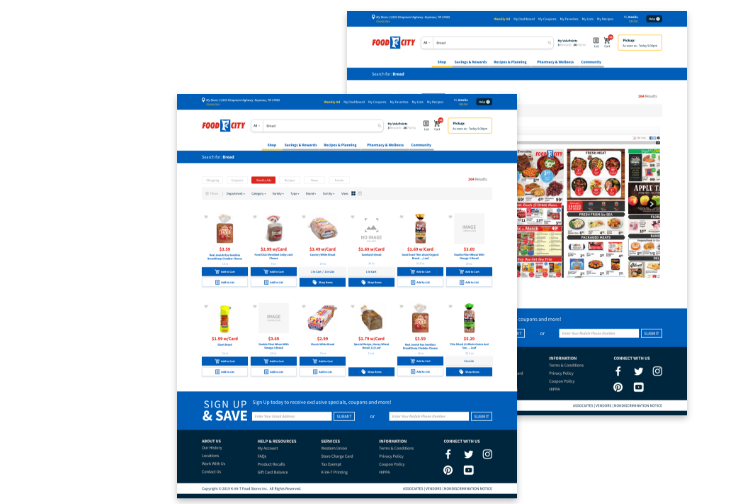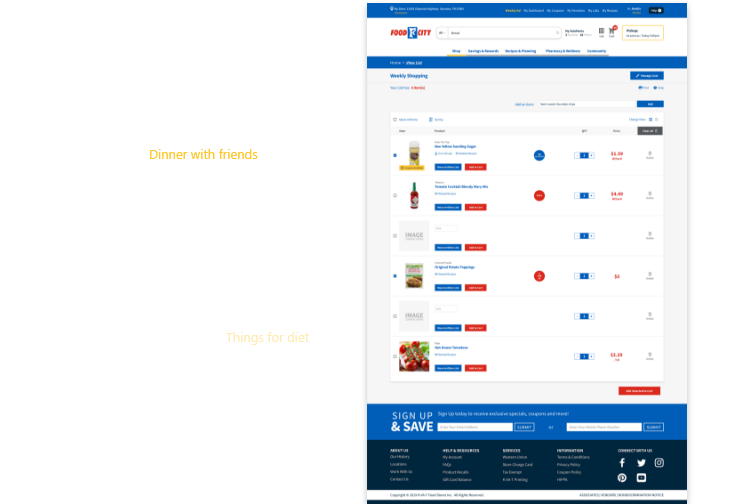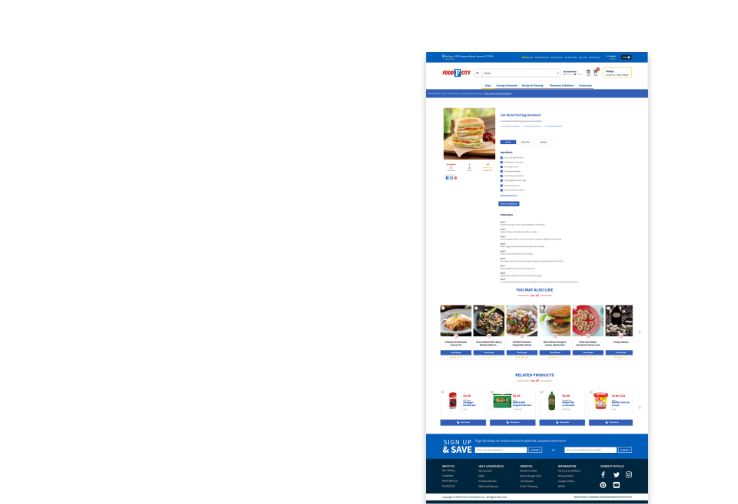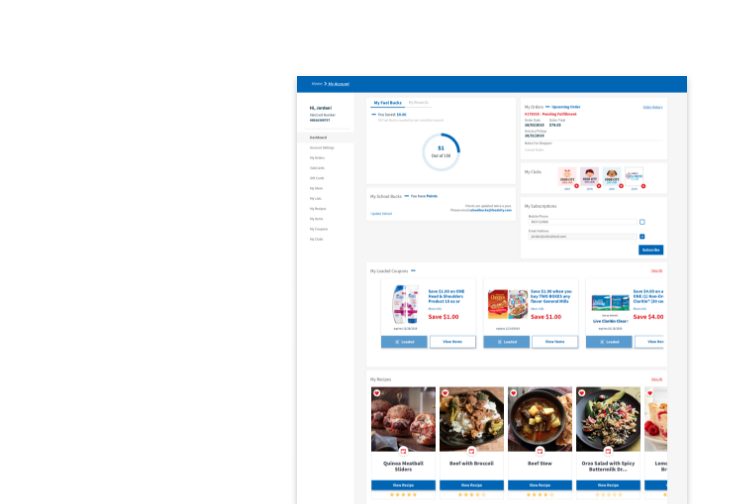
Wellness Club — Healthy Aging and Vaccines
Abingdon, VA. -
Sunday, Sep 1, 2024.
Written by: Rebecca Webb, PharmD Pharmacy Clinical Services Manager
According to the World Health Organization (WHO), healthy aging is defined as “the process of developing and maintaining the functional ability that enables wellbeing in older age.” A key part of healthy aging and living longer is proactively managing physical health. As an individual ages, there is a progressive decline in the immune system that can lead to an increase in the incidence and severity of certain illnesses. Vaccination is one of the most effective and valuable tools available to protect against serious diseases as we age. Do not let its importance be underestimated. A quick trip to your local Food City Pharmacy to get vaccinated can go a long way to support your journey into healthy aging.
Adults ages 65 and older should talk with their Food City Pharmacist about the following vaccines:
o Flu (influenza) vaccine
o COVID-19 vaccine
o Pneumococcal vaccine
o Shingles (herpes zoster) vaccine
o Tdap (tetanus, diphtheria, and pertussis) or Td (tetanus and diphtheria) vaccine
o Respiratory syncytial virus (RSV) vaccine
o Travel vaccines (if applicable)
Flu (influenza) vaccine:
• The flu is a contagious respiratory illness caused by influenza viruses.
• Cases of the flu can be mild to severe, even leading to death.
• Individuals with the flu can have signs and symptoms that appear suddenly and include fever, cough, chills, sore throat, runny/stuffy nose, headaches, muscle/body aches, and fatigue.
• Individuals 65 years and older are at higher risk for developing serious flu-related complications, such as pneumonia.
• Individuals who receive their flu vaccine are less likely to become seriously ill or hospitalized with the flu.
• The Centers for Disease Control and Prevention (CDC) recommends being vaccinated for flu by the end of October each year. After vaccination, flu vaccines take about two weeks to build immunity to be protective against the flu.
• There are several flu vaccines designed specifically for older adults to help create a stronger immune response. The CDC preferentially recommends that individuals 65 years and older receive one of these flu vaccines (e.g., Fluzone High-Dose vaccine, Fluad adjuvanted vaccine).
COVID-19 vaccine:
• COVID-19 is a disease caused by the SARS-CoV-2 virus. This virus is constantly changing and can spread rapidly from person to person.
• Individuals with COVID-19 can have a wide range of symptoms including fever, fatigue, chills, cough, shortness of breath, muscle/body aches, runny/stuffy nose, sore throat, headache, nausea/vomiting/diarrhea, or a new loss of smell/taste. Some individuals may have no symptoms at all.
• Older adults are at highest risk of severe illness with COVID-19. Most deaths attributable to COVID-19 are in individuals over 65 years of age.
• Individuals who are up to date on their COVID-19 vaccinations are less likely to have severe illness, hospitalizations, and death due to COVID-19.
• The 2024-2025 COVID-19 vaccines are expected to be available early fall.
Pneumococcal vaccine:
• Pneumococcal disease is a serious infection caused by the bacteria Streptococcus pneumoniae. This bacteria can cause numerous types of infections including pneumonia, meningitis, middle ear infections, sinus infections, and bloodstream infections.
• Streptococcus pneumoniae spreads from person to person through respiratory secretions.
• Symptoms of pneumococcal disease depend upon the area of the body that is infected.
• Individuals 65 years and older are at a higher risk for pneumococcal disease.
• Pneumococcal vaccines are the best tool in protecting against serious pneumococcal infections.
• There are several forms of the pneumococcal vaccine and the CDC’s pneumococcal vaccination recommendations are based on age and/or certain risk factors.
Shingles (herpes zoster) vaccine:
• Shingles occurs when the varicella-zoster virus reactivates in the body after having chickenpox earlier in life. Individuals who never had chickenpox or did not receive the chickenpox vaccine can become infected with the varicella-zoster virus from another individual who has shingles.
• According to the CDC, around one out of every three individuals in the U.S. will have shingles.
• A common symptom of shingles is a painful, itchy rash which develops usually as a single stripe on one side of the face/body and can consist of fluid-filled blisters. Other symptoms can include fever, chills, headaches, and upset stomach.
• Postherpetic neuralgia is a long-term complication of shingles. This type of nerve pain occurs where the shingles rash was located and can remain for months to years after the rash disappears.
• The shingles vaccine is the only tool in protecting against shingles and postherpetic neuralgia.
Tetanus, diphtheria, and pertussis:
• Tetanus, sometimes called lockjaw, is caused by a bacteria found in soil, manure, and dust called Clostridium tetani. This bacteria can enter the body through a deep cut or burn. Signs and symptoms of a tetanus infection can include involuntary muscle spasms (e.g., jaw muscles, stomach muscles), muscle stiffness, trouble swallowing, seizures, headache, fever, sweating, and changes in blood pressure and heart rate.
• Diphtheria is a serious illness resulting from the toxin produced by the bacteria Corynebacterium diphtheriae. Symptoms depend upon the part of the body affected. Respiratory diphtheria can manifest with a fever, sore throat, swollen neck glands, weakness, and the hallmark symptom of a thick coating of dead tissue (i.e., “pseudomembrane”) build up in the throat and nose making breathing and swallowing difficult.
• Pertussis, also known as whooping cough, is a contagious respiratory illness caused by the Bordetella pertussis bacteria. Symptoms include uncontrollable, violent coughing fits followed by a high-pitched “whoop” noise when the individual gasps for air.
• Getting vaccinated is the best way to prevent tetanus, diphtheria, and pertussis.
• Most people get vaccinated as children, but you also need booster shots as you get older to stay protected against these diseases. The CDC recommends that adults get a Tdap (i.e., tetanus, diphtheria, and pertussis) or Td (i.e., tetanus, diphtheria) booster dose every 10 years.
Respiratory Syncytial Virus (RSV) vaccine:
• RSV is a common respiratory virus that typically spreads in the fall/winter and peaks in December/January.
• Symptoms of RSV are similar to those of the common cold or other respiratory viruses. These can include coughing, wheezing, runny nose, sneezing, fever, and a decrease in appetite.
• Adults are at highest risk for severe RSV infection. According to the CDC, it is estimated that between 60,000 to 160,000 older adults are hospitalized in the U.S. each year due to RSV infection.
• The CDC currently recommends:
— All adults ages 75 and older get an RSV vaccine.
— All adults ages 60-74 who are at increased risk of severe RSV disease get an RSV vaccine.
• The RSV vaccine is not currently an annual vaccine. If an individual has already received an RSV vaccine, another dose is not needed at this time.
Travel vaccines:
If you are planning to travel abroad, talk with your Food City Pharmacist about the importance of travel vaccines. There may be specific vaccine requirements for your destinations. On some occasions when traveling, multiple vaccines or doses are needed. Oftentimes, there will need to be sufficient timing allowed for the buildup of your immune system.
References:
1. COVID-19. Centers for Disease Control and Prevention (CDC) website. https://www.cdc.gov/covid/index.html. Accessed August 14, 2024.
2. Healthy ageing and functional ability. The World Health Organization (WHO) website. https://www.who.int/news-room/questions-and-answers/item/healthy-ageing-and-functional-ability. Accessed August 12, 2024.
3. Key Facts About Seasonal Flu Vaccine. Centers for Disease Control and Prevention (CDC) website. https://www.cdc.gov/flu/prevent/keyfacts.htm. Accessed August 14, 2024.
4. Pneumonia. Centers for Disease Control and Prevention (CDC) website. https://www.cdc.gov/pneumonia/index.html. Accessed August 14, 2024.
5. Respiratory Syncytial Virus Infection (RSV). Centers for Disease Control and Prevention (CDC) website. https://www.cdc.gov/rsv/index.html. Accessed August 15, 2024.
6. Shingles (Herpes Zoster). Centers for Disease Control and Prevention (CDC) website. https://www.cdc.gov/shingles/. Accessed August 14, 2024.
7. Tdap (Tetanus, Diphtheria, Pertussis) VIS. Centers for Disease Control and Prevention (CDC) website. https://www.cdc.gov/vaccines/hcp/vis/vis-statements/tdap.html. Accessed August 15, 2024.
8. Vaccinations and Older Adults. National Institute on Aging website. https://www.nia.nih.gov/health/immunizations-and-vaccines/vaccinations-and-older-adults. Accessed August 13, 2024.












